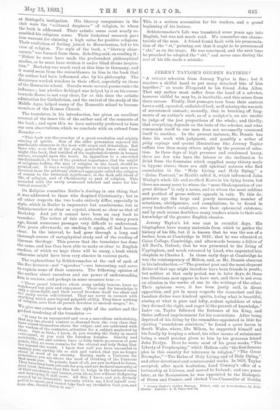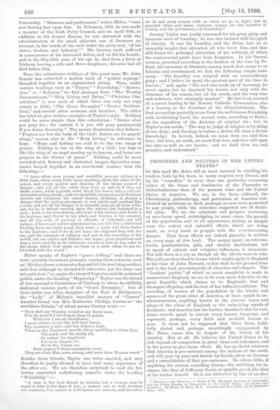JEREMY TAYLOR'S GOLDEN SAYINGS.*
" A SINGLE selection from Jeremy Taylor is fine ; but it requires a skilful hand to put many detached bits of him together;" so wrote Fitzgerald to his friend John Allen. That any author must suffer from the hand of a selector, however skilful he may be, is inevitable, and this arises from three causes. Firstly, that passages torn from their context have a cold, uprooted, unfinished look, as if missing the warmth of accustomed contact; secondly, that in breaking off frag- ments of an author's work, as of a sculptor's, we are unable to judge of the just proportions of the whole ; and thirdly, that everything depends on the taste of the selector, and what commends itself to one man does not necessarily commend itself to another. In the present instance, Mr. Dennis has done his work with judgment, and possibly a writer of pithy sayings and quaint illustrations like Jeremy Taylor suffers lees than many others might by the process of selec- tion. In these days of high pressure and condensed hurry, there arc few who have the leisure or the inclination to drink from the fountains which supplied many thirsty souls in bygone times ; there are still spiritual natures who find consolation in the " Holy Living and Holy Dying," a " divine Pastoral," as Hazlitt called it, which influenced John Wesley's whole life and soothed Keats in his dying hours, but there are many more to whom the " most Shakespearian of our great divines" is only a name, and to whom the most sublime and poetical of prose-writers appeals in vain. To this de- generate age the large and yearly increasing number of selections, abridgments, and compilations, to be found in every bookseller's catalogue, owe their ephemeral existence, and by such means doubtless many readers attain to their sole knowledge of the greater English classics.
Jeremy Taylor's lot was cast in eventful days. His biographers have scanty materials from which to gather the history of his life, but it is known that he was the son of a barber, born at Cambridge in 1613 ; that he was educated at Caius College, Cambridge, and afterwards became a fellow of All Soul's, Oxford; that he was presented to the living of Uppingham, and much esteemed by Laud, who appointed him chaplain to Charles I. In those early days at Cambridge he was the contemporary of Milton, and, as Mr. Dennis observes in his introduction,—" The greatest poet and the most eloquent divine of that age might therefore have been friends in youth; but neither at that early period, nor in later days, do these two illustrious men appear to have met, and there is not even an allusion in the works of one to the writings of the other. Their opinions were, it has been justly said, in direct opposition, and yet in many respects the iconoclast and the Laudian divine were kindred spirits, loving what is beautiful, aiming at what is pure and lofty, ardent upholders of what they deemed the right, and eager if: the pursuit of knowledge." Later on, Taylor followed the fortunes of his King, and thrice suffered imprisonment for his convictions. After being deprived of his living by the committee appointed in 1640 for ejecting "scandalous ministers," he found a quiet haven in South Wales, where, like Milton, he supported himself and his family by keeping a school, his other means of subsistence being a small pension given to him by his generous friend John Evelyn. Here he wrote most of his great works, "The Liberty of Prophesying," which Hallam calls "the first famous plea in this country for tolerance in religion," "The Great Exemplar," "The Rules of Holy Living and of Holy Dying," and other devotional and controversial works. In 1658, Taylor accepted, after much hesitation, Lord Conway's offer of a lectureship at Lisburn, and moved to Ireland ; and two years later, at the Restoration, he was appointed to the Bishopric of Down and Connor, and elected Vice-Chancellor of Dublin • Jeremy Taylor's Golden Sayings. Edited, with an Introduction, by John Dennis. London : A. D. Lams and Co.
University. "Honours and preferment," writes Heber, "were now flowing fast upon him. In February, 1661, he was made a member of the Irish Privy Council, and on April 30th, in addition to his former diocese, he was entrusted with the administration of the small adjacent one of Dromore on account, in the words of the writ under the privy-seal, of his virtue, wisdom, and industry.' " His literary work suffered in consequence of his increased duties, and so did his health ; and in the fifty-fifth year of his age he died from a fever at Lisburn, leaving a wife and three daughters ; his sons had all died before him.
From the voluminous writings of this great man, Mr. John Dennis has extracted a modest book of " golden sayings," threaded together on an alphabetical string. Thus, under various headings such as " Prayer," " Friendship," " Recrea- tion," or " Religion," we find passages from " The Worthy Communicant," " Holy Living and Dying," " Christian Con- solations" (a rare work of which there was only one copy extant in 1822), " The Great Exemplar," "Ductor Dubitan- tium," and several other sermons and treatises. The editor has tried to give various examples of Taylor's style. Nothing could be more simple than this exhortation : "Desire what you pray for ; for certain it is you will pray passionately if you desire fervently." The quaint illustration that follows : "Prayers are but the body of the bird; desires are its angels' wings," occurs also in the " Holy Living," in reference to hope. "Hope and fasting are said to be the two wings of prayer. Fasting is bnt as the wing of a bird ; but hope is like the wing of an angel soaring up to heaven, and bears our prayers to the throne of grace." Nothing could be more crowded with flowery and rhetorical images, figurative orna- ments heaped together in an over-lavish manner than the following :—
" I have often seen young and unskilful persons sitting in a little boat, when every little wave sporting about the sides of the vessel, and every motion and dancing of the barge seemed a danger ; and yet all the while they were as safe as if they at under a tree, while a gentle wind shook the leaves into a refresh- ment and cooling shade ; and the unskilful, inexperienced Christian shrieks out whenever his vessel shakes, thinking it always a danger that the watery pavement is not stable and resident like a rock, and yet all his danger is in himself, none at all from with- out, for he is indeed moving upon the waters, but fastened to a rock ; faith is his foundation, and hope is his anchor, and death is his harbour, and Christ is his pilot, and heaven is his country, and all the evils of poverty or affronts of tribunals and evil judges, of fears and sadder apprehensions, are but like a loud wind blowing from the right point, they make a noise and drive faster to the harbour; and if we do not leave the ship and leap into the sea, quit the interests of religion and run to the securities of the world, cut our cables and dissolve our hopes, grow impatient and hug a wave and die in its embraces, we are as safe at sea, safer in the storm which God sends us, than in a calm when we are be- friended with the world."
Heber speaks of Taylor's " grave trifling," and there are some quaintly humorous passages among these extracts, such as," He that threw a stone at a dog and hit his cruel step-mother, said that although he intended it otherwise, yet the stone was not quite lost ;" or, again, the story of Leporina and the poisoned goblet, under the heading " Hypocrisy." Taylor was the friend of two successive Countesses of Carbery, to whom he skilfully dedicated various parts of his " Great Exemplar." One of these ladies was Alice, daughter of the Earl of Bridgwater, the "Lady" of Milton's beautiful masque of " Comus."
Another friend was Mrs. Katherine Phillips, known as " the matchless Orinda," of whose poems Cowley wrote Thou dost my Wonder, would'st my Envy raise, If to be prais'd I lov'd more than to praise. Whene'er I see an Excellence, I most admire to see thy well-knit Sense, Thy numbers gentle, and thy Fancies high, Those as thy Forehead smooth, these sparkling as thine Eye. 'Tie solid, and 'tie manly all, Or rather 'tie Angelical, For as in Angels, we Do in thy Verses see Both improv'd Sexes eminently meet, They are than Man more strong, and more than Woman sweet."
Besides these friends, Taylor was twice married, and may therefore be justly allowed to have had some experience of the other sex. We are therefore surprised to read the fol-
lowing somewhat unflattering remarks under the heading " Friendship " :—
" A man is the beet friend in trouble, but a woman may bo equal to him in the days of joy ; a woman can as well increase our comforts, but cannot so well lessen our sorrows, and therefore
we do not carry women with us when we go to fight ; but in peaceful cities and times, virtuous women are the beauties of society, and the prettinesses of friendship."
Jeremy Taylor was justly renowned for his great piety and immense store of learning; he was also imbued with the spirit of charity. It was his humility and the divine love he so earnestly taught that attracted all who knew him, and that still forms the principal attraction of his writings, of which the controversial parts have been forgotten. In his funeral sermon, preached according to the fashion of the time by Dr. Rust, his successor at Dromore, among much that seems to us fulsome and overstrained, we find the following simple testi- mony: "His humility was coupled with an extraordinary piety; and I believe he spent the greatest part of his time in heaven ; " and, again, " His soul was made up of harmony, he never spake, but he charmed his hearer, not only with the clearness of his reason, but all his words, and his very tone and cadences, were strangely musical." He has been accused of a secret leaning to the Roman Catholic Communion, also of a leaning to the doctrines of the ultra-Calvinists. The first accusation probably arose from his well-known friendship with Archbishop Laud, the second rests, according to Heber, on his exposition of the doctrine of original sin ; but, in Taylor's own words, " The way to judge of religion is by doing of our duty; and theology is rather a divine life than a divine knowledge. In heaven, indeed, we must first see, and then love; but here, on earth, we must first love, and love will open our eyes as well as our hearts ; and we shall then see, and perceive, and understand."



































 Previous page
Previous page